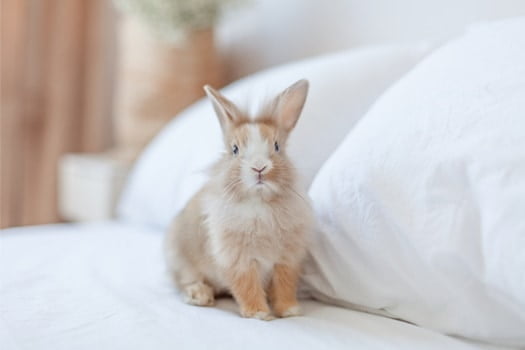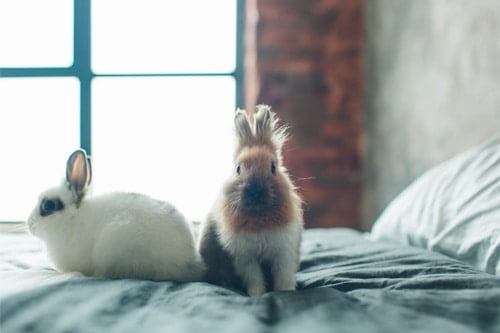Conventional wisdom suggests that rabbits sleep in a hutch at night. But small animals, such as rabbits, like to sleep next to their owners. They enjoy the soft bedding, warm, and companionship.
Rabbits are delicate. Your pet could be crushed or suffocated if you roll on them during the night. Even if your rabbit is safe, she may keep you up at night by acting mischievously.
If your rabbit wants to sleep with you and can do so safely, it’s fine. If you’re prepared to risk losing sleep, sharing a bed with a rabbit will deepen your bond. Just remember that rabbits like routine. You can’t share your bed some nights but not others. That will only serve to confuse her.
Is It Safe for a Rabbit to Sleep in a Human Bed?
You may notice that your pet naps on your bed during the day. Rabbits love soft furnishings, and she’ll take comfort from your scent.
Your rabbit sleeping in your bed with you at night is slightly different. Rabbits are small and frail. If you toss and turn in your sleep, you risk crushing or suffocating your rabbit.
If you’re confident that this will not happen, you can share your bed. You’ll just need to take precautions to rabbit-proof the bedroom. Steps to take include:
- Ensure your rabbit is litter trained. This should prevent nocturnal accidents in or on your bed. Keeping a litter tray in the room will be an additional safety step.
- Close the door. If your rabbit goes for a wander at night, she could get into trouble. She could escape the house, meet other pets, or chew something dangerous.
- Put cushions on the floor around your bed so your pet will have a soft landing if she falls off.
- Cover up anything in the room that could be chewed or otherwise damaged.
- Remove any toxins from your room, such as houseplants. Avoid using room fresheners or other strong smells. Don’t smoke in your bedroom. Rabbits are often allergic to cigarette smoke.
- Ensure that the room is a comfortable temperature for your pet. Rabbits prefer cooler temperatures to excess warmth. If you sleep with central heating on, your rabbit will overheat.
- Provide your rabbit with something to burrow in, like an extra blanket. Rabbits like to simulate the experience of sleeping underground. Your pet will likely make herself a warm, dark nest.
There’s one other thing to note. Allowing a rabbit to sleep in your bed creates a precedent. She will expect this treatment every night going forward.
Rabbits do not understand conditions. Your pet doesn’t care that have an early morning meeting, and need a good night’s sleep. Only allow your rabbit into your bed if you’re prepared to make it a permanent arrangement.
Why Does Your Rabbit Sleep in Bed with You?
If your rabbit insists on sleeping in your bed, try to find out why it happens:
- Is your rabbit afraid to be alone in her hutch at night?
- Is your rabbit’s hutch cold, drafty or housed in a noisy location?
- Does your rabbit’s hutch lack the physical comfort required for a good night’s sleep?
- Does your rabbit spend the entire day alone, and crave company by night?
- Has your rabbit not had enough exercise? She may be wide awake and expect your attention.
If you can encourage your rabbit to sleep in her own hutch, it’s advisable. You’ll save her from potential injury, and likely enjoy a better night’s sleep yourself.
Advantages of Rabbits Sharing Your Bed
The biggest benefit of sharing a bed with your rabbit is the bond that you’ll share. Once rabbits bond with an owner, they become fiercely loyal. Your rabbit will love spending time with you, regardless of whether you’re awake or asleep.
It’s also believed that sleeping with pets boosts human health. It’s claimed that animal companionship at night promotes calmness, and reduces stress and anxiety.
You may also be making your rabbit much happier by allowing her to sleep with you. Some rabbits loathe spending the night alone. If you can train your rabbit to love her hutch at night, that’s ideal. If not, she’ll be grateful not to be banished when the sun goes down.
If you live alone, a rabbit will be a night watchman. Obviously a rabbit will not be as ferocious a protector as a dog. Your pet will be constantly vigilant, though.
If something untoward is unfolding outside your home, she’ll know about it. This means that you’ll also know as you’ll be alerted. This could add an extra layer of security when you’re most vulnerable.

Disadvantages of Rabbits Sharing Your Bed
We have explored the inherent physical dangers of sharing a bed with a rabbit. You must be vigilant and avoiding physical contact. Worrying about this may keep you up at night.
Even if your pet has her own side of the bed, there are other concerns. Rabbits keep slightly different hours to humans. Even if you are ready for bed, your rabbit may disagree.
If your rabbit is still awake and lively, she will expect entertainment. She may nip your toes or ears while you sleep. This is a message to say, “stop ignoring me, it’s playtime.”
Even if your rabbit amuses herself, she could keep you awake. She may start exploring the room. If she starts climbing furniture, she could knock things over. Rabbits cannot see in the dark, and have poor depth perception.
Think back to what we said about a rabbit’s vigilance. If you live in a quiet area, this is a benefit. Strange noises could merit investigation. If you live in the city, it’s different. There will be a constant stream of noise. Being nudged by a wide-eyed pet every time a car passes will quickly grow old.
Rabbits are capable of snoring. As PetMD explains, rabbits can snore while they’re awake too. The cause will be an obstruction to the nasal airways. If the snore is high-pitched, it’s called stridor. A lower, guttural snore is referred to as stertor.
My Rabbit Sleeps Under My Bed
Domesticated and wild rabbits are very different, but both animals share similar instincts. One example is seeking dark, covered locations to sleep. Your pet is mimicking the sensation of sleeping in an underground burrow.
If your rabbit sleeps under the bed, it’s nothing to worry about. You will need to step up your cleaning, though. Rabbit noses are sensitive to dust. Vacuum under the bed regularly. Just make sure your pet isn’t there before you start as the noise will deafen her.
If your rabbit makes a habit of sleeping under your bed, make it comfortable. Lay a soft blanket down. If one will fit, provide a pillow too. This makes it clear that your pet always has a safe space.
Don’t use the space for storage, either. Under the bed is now your rabbit’s territory. If you keep shoes or anything else in the vicinity, expect them to be chewed.
Why Does My Rabbit Hide Under the Bed?
Much like when sleeping, rabbits hide under the bed as it’s equivalent to a burrow. As BunnyHugga explains, rabbits like a covered location with a simple entrance and exit.
Perhaps a more pertinent question is why is your rabbit hiding. She has clearly been spooked by something. The slot under the bed is her safe space. She will emerge when she has calmed down.
There are a number of reasons why your rabbit may feel compelled to hide. Rabbits are nervous animals, as they are a natural prey species. If your rabbit has any reason to believe a predator is in the vicinity, she’ll hide.
Your pet also has excellent hearing. Any loud noise will provoke a fear-based reaction. If you live in a busy area, she’ll hear ambulances, car horns and shouted conversations. This may lead to sensory overload and the need for a time out.
Rabbits also dislike change and often fear new humans. If you have company, a free-running rabbit may be spooked. Most often, your pet’s curiosity will overpower her fear. She’ll wander out to investigate eventually.
Why Does My Rabbit Wee on My Bed?
Your rabbit will notice that your bed is important to you. You get in bed every day, after all. You also seem to spend several hours in bed at a time.
When rabbit discover something is important to a human, one thought enters their head – “that’s mine.” As territorial animals, rabbits want to claim what you cherish. That involves marking their scent, and not much smells stronger than rabbit urine.
You will need to train your rabbit to stop peeing on the bed. It is smelly and unhygienic, and it sets a dangerous precedent. Rabbits like to feel like they are the boss. Allowing her to mark this way cements this status in your pet’s mind.
Use a low, firm, “no” command, ideally while she’s in the act. Make sure you remove all traces of the scent. If she smells her own pee, your rabbit will return and do the same again.
If the behavior continues, investigate why. Your rabbit clearly considers it necessary to assert her dominance. Do whatever it takes to calm your pet down and make her feel comfortable.

